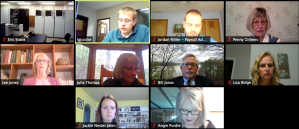Monroe County hits $160K in food and beverage tax distributions for COVID-19 business relief, looks for approval of another $200K

At their regular Wednesday morning meeting, Monroe County commissioners authorized another $95,500 in support of COVID-19 relief for tourism-related businesses outside the city of Bloomington.
Nine business received grant awards ranging from $2,500 to $23,000.

That adds to the total of $68,352 they approved last week for the same purpose.
Some of the roughly $36,000 that now remains from a $200,000 appropriation of food and beverage tax proceeds could be distributed to other businesses on Friday at 3 p.m. That’s when the commissioners will resume their meeting. The Wednesday session was not adjourned.
President of the board of commissioners, Julie Thomas, said that the applications that might be considered by Friday had come in after a soft deadline.
Also at Wednesday’s meeting, commissioners authorized a request to the food and beverage tax advisory commission (FABTAC ) of another $200,000 for COVID-19 business relief.
Same as before, the relief would go to tourism-related businesses in the county and outside the city limits of Bloomington. FABTAC would likely need to convene a special meeting to consider the request.
Tied to the possibility of allocating additional food and beverage tax funds to COVID-19 relief is some expected action on Friday by Indiana’s governor Eric Holcomb. That’s when Holcomb is expected to extend the existing statewide stay-at-home order, possibly lifting some restrictions, as an initial step towards phasing back some economic activity.
With county attorney Jeff Cockerill, commissioners discussed the fact the use of the food and beverage tax money for COVID-19 relief is contingent on the governor’s emergency order, based on guidance from the State Board of Accounts (SBOA). Cockerill thinks that as long as a governor’s emergency order leaves any restrictions on business activity in place, the use of food and beverage tax money for relief would pass muster with the SBOA.
The crucial determination from the SBOA’s point of view, is that the use of dedicated funds, like proceeds from the food and beverage tax, is for an emergency purpose that is more closely related to the dedicated funds than the general fund.
Food and beverage tax money comes with the restriction that it be used for the convention center expansion or for related tourism and economic development projects. That’s why the COVID-19 relief money is restricted to tourism-related businesses.
The tie to tourism is one of the four criteria used by county commissioners in reviewing applicants for the COVID-19 grant program. The other three criteria are: showing the business suffered a loss; explaining what the grant money would fund; description of other federal and state programs the business is applying for.
The county’s portion of the food and beverage tax, as contrasted with the city of Bloomington’s share, is not going towards the convention center expansion in any case.
Of the roughly $700,000 in the county’s shared of unexpended food and beverage tax funds, $500,000 has been approved for a limestone destination heritage site. The remaining $200,000 was approved for the first wave of the county’s COVID-19 relief funding. The second $200,000 looks like it will start to take away from the half million dollars that has been set aside for the limestone heritage site.
Even if Holcomb extends the emergency order another two weeks, it will still put county elected and appointed officials under a tight timeline to get the second $200,000 approved. FABTAC will need to approve the request, and the county council will need to make the appropriation, which needs to be advertised in advance.
At Wednesday’s meeting, Cockerill said the county council’s consideration of an additional appropriation of food and beverage money had already been advertised, but with a $100,000 amount.
During public commentary, county councilor Geoff McKim chimed in to say he fully supports the second $200,000. McKim said he would vote to approve the appropriation at $100,000 or $200,000.
Also during public commentary, Randy Paul suggesting delaying the convention center expansion project and allocating all proceeds from the food and beverage tax to COVID-19 business relief.
President of the board of commissioners, Julie Thomas, responded to Paul by saying, “I don’t see a convention center [expansion] in our future.” The question of rescinding the food and beverage tax would be a question for the county council, Thomas said.
The county council enacted the food and beverage tax in late 2017 on a 4–3 split vote.
At Wednesday’s meeting, commissioners also extended the countywide emergency declaration to May 15 and approved already-announced awards of $10,000 apiece to the food pantries, Mother Hubbard’s Cupboard and Pantry 279.
Approved April 29, 2020
| Grantee | Amount |
| Eagle Pointe (golf course, bar, venue) | $23,000 |
| Port Hole Inn | $20,000 |
| Cabin Restaurant and Lounge | $10,500 |
| Beaumont House (bed and breakfast) | $10,000 |
| Whippoorwill Hill (farm event venue) | $10,000 |
| Sugar Daddy’s Cakes & Catering Cafe | $8,000 |
| Rieman Properties | $6,500 |
| Westbury Antique Market | $5,000 |
| Dance Machine DJ Services | $2,500 |
| Total | $95,500 |
Approved April 22, 2020
| Grantee | Amount |
| Knightridge, Inc. (Scenic View restaurant) | $15,274 |
| Wee Willies West (restaurant) | $10,000 |
| Big Sky Campgrounds | $8,950 |
| Trailhead Enterprises, Inc. (pizzeria on SR 446) | $8,528 |
| Back to Nature Cabins | $7,000 |
| Sycamore Farms Bloomington, Inc. (event venue) | $5,000 |
| Terry’s Catering, LLC. | $5,000 |
| Robert Woodling Rentals | $3,800 |
| U’sta-B-New (antique shop) | $3,000 |
| Trivia with Skip (bookings) | $1,800 |
| Total: | $68,352 |




Comments ()